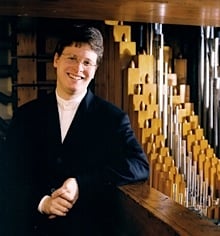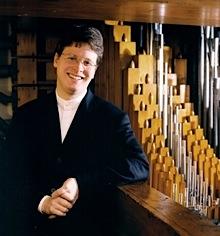
Jacobs’ mission has included multiple marathons of the complete Messiaen organ oeuvre in seven major U.S. cities, including San Francisco. Just last season, he soloed with the San Francisco Symphony and presented a solo recital as part of the 25th anniversary celebration of the Ruffatti organ in Davies Symphony Hall. On Jan. 17, he returns to Davies to perform a program that would convince many a lesser organist to hide behind the console.
Jacobs is so eloquent when he talks about the organ that it seems best to cede the floor to a still-young master.
“I will begin with Max Reger’s monumental Second Organ Sonata, full of ravishing tenderness one moment, and muscular force the next. Reger was extremely prolific, and produced a massive body of music in a relatively short life. While he occasionally didn’t have time or inclination to edit or prune his works, I’m quite convinced that he is a sorely underestimated and underappreciated composer. Frequently, listeners and music lovers operate on preconceived notions of his works without ever having an encounter with this genius. The charge is that his music is dense, cumbersome, and heavy, when in fact it is frequently extraordinary, filled with luminous transparency and even a touch of humor. In fact, few composers after Bach were able to write fugues with such profound emotive power and charge as Reger.”
See what I mean?
“Then we shift gears quite dramatically for the intimate Prelude in F Minor by Nadia Boulanger. It shows that the organ is capable of being sensuous, delicate, and very nuanced and subtle. The same adjectives apply to Boulanger’s small but exquisite body of organ music. [She commissioned and performed the premiere of Copland’s Organ Symphony — the work that supposedly established him as having chops.] Her Prelude has three movements, the first of which is quintessentially French in terms of melodic inflection and color.”
Without pausing between works, Jacobs will end the first half with the “zesty” Finale in B Flat by César Franck. He calls what is perhaps the most virtuosic work in Franck’s canon a “fireworks display for the feet.”
After traveling from Germany to France in the first half, Jacobs returns to Germany after intermission.
“This being an anniversary year for Robert Schumann, I’ll play his Canon in A-flat Major. Schumann thought very highly of his organ works; they are elevated pieces of music, very lyrical, attractive to the ear, and skillfully composed. His Canon is similar in scale to the Boulanger, brief and intimate.”
Barring an encore, Jacobs will end with Julius Reubke’s Sonata on the 94th Psalm. A star pupil of Franz Liszt’s, Reubke died at age 24, leaving behind two large works: a piano sonata and one for organ.
“Both are awesome in their scope and range of expression. Had Reubke lived longer, he might have even surpassed Liszt. There’s no telling what he would have produced, based on the success and quality of these two sonatas. His death is perhaps one of the tragedies in the history of music.”
Jacobs was both “encouraged and inspired by the sensitive and large audience” that greeted him last season in Davies. The organist who indulges in multiple adjectives as frequently as he astounds with his multilimbed musicianship is prepared to inspire and delight us once again.

